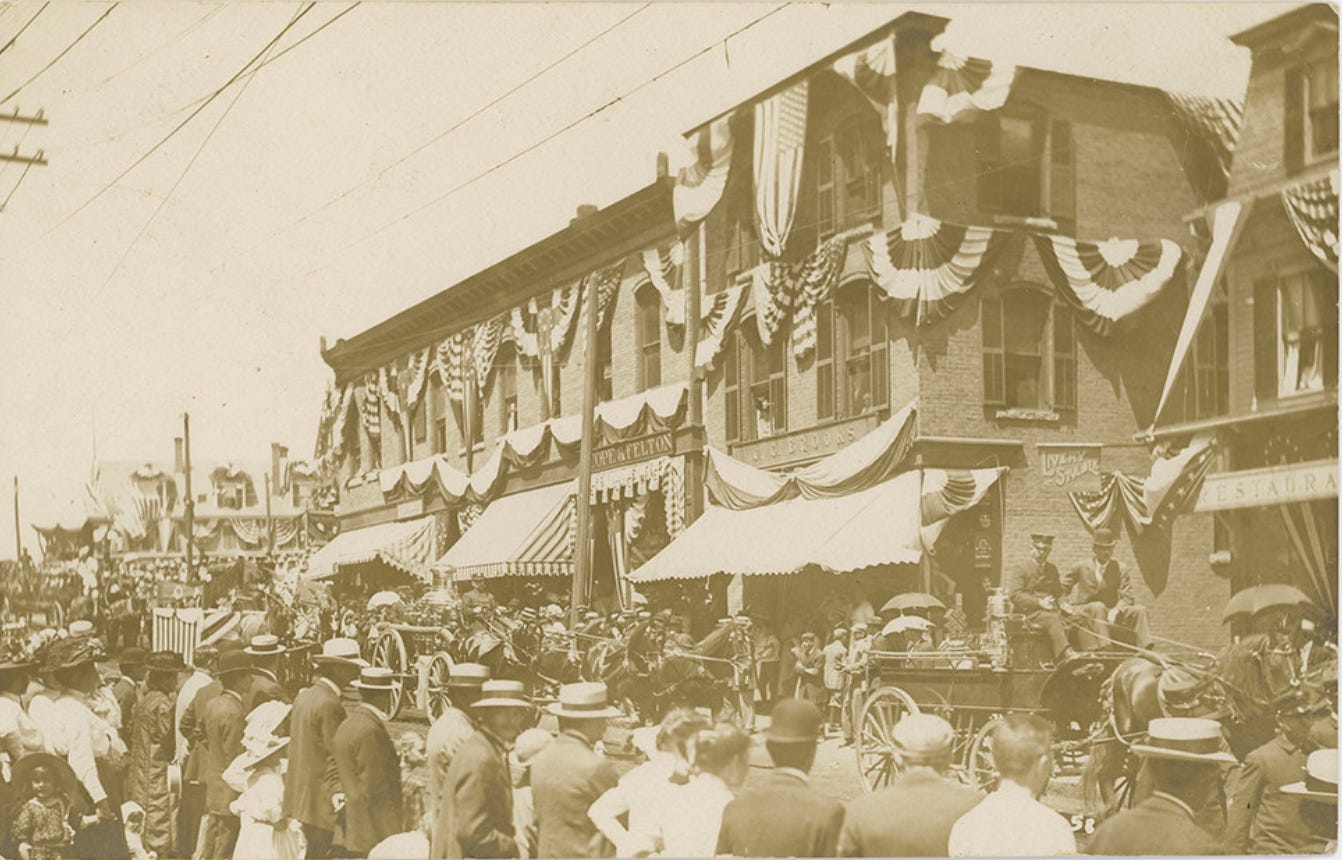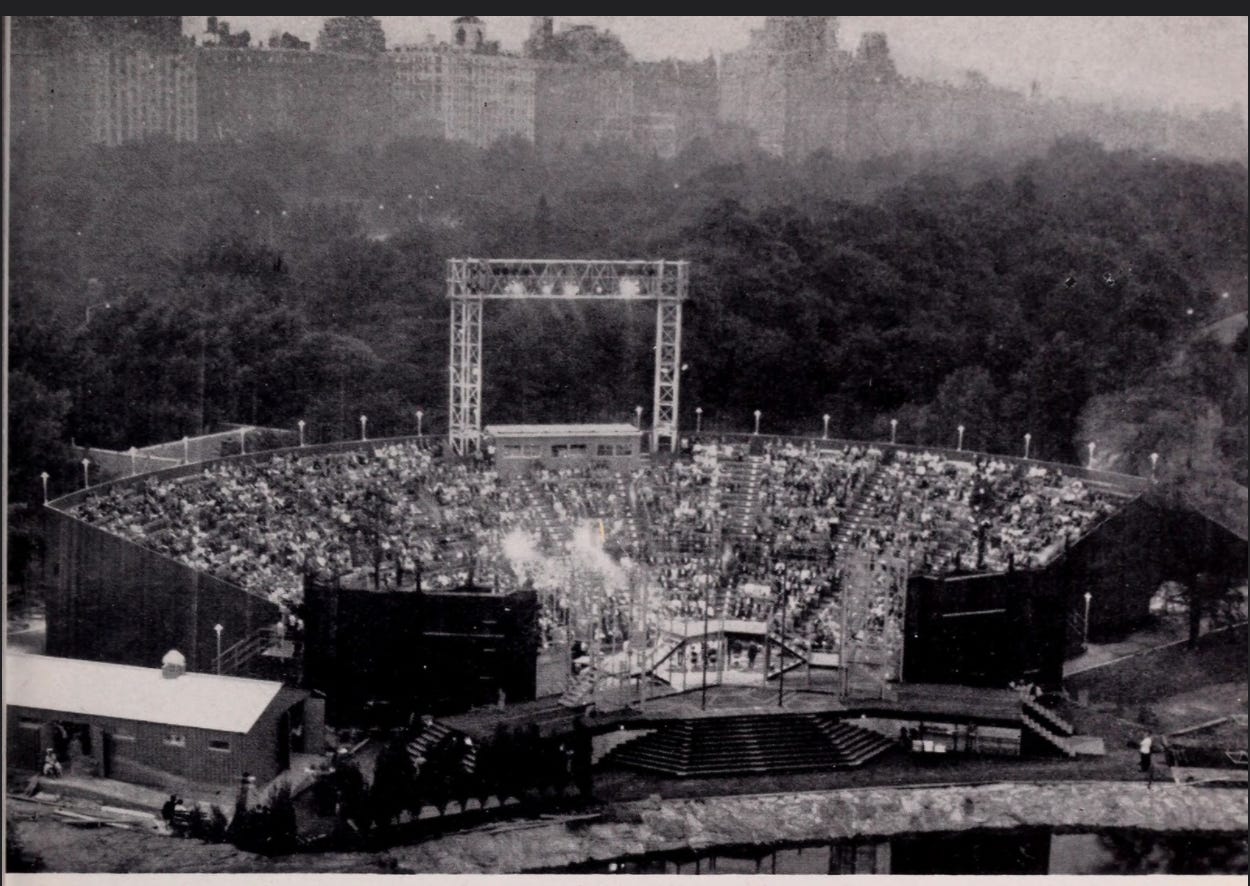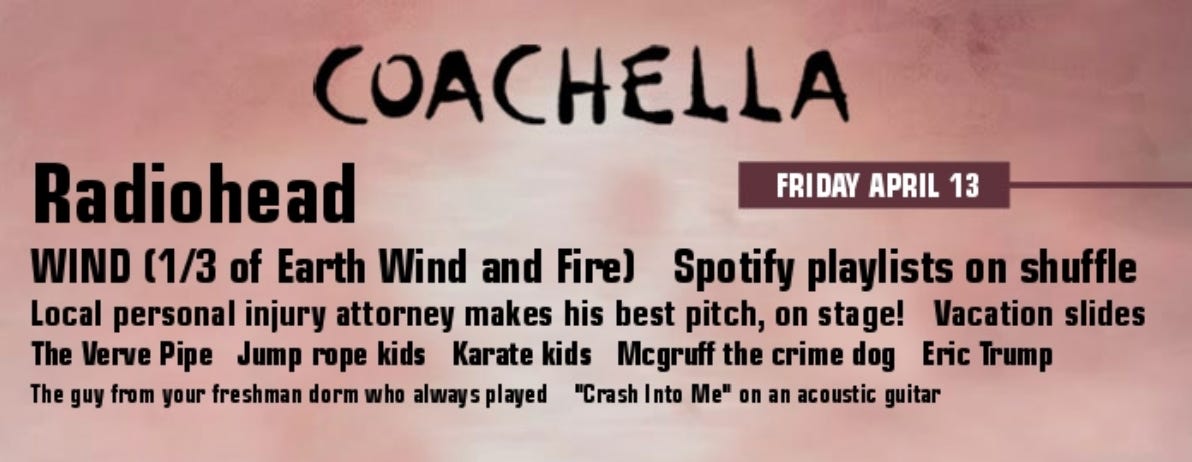What if everything we have to gain is more beautiful than everything we have to lose...
We are so loyal to such imperfect institutions

SMU Libraries Digital Collection
This week’s dedications/recommendations: As many of you know, I am in the process of kicking off a set of white anti-racist organizing cohorts. One of the things I asked cohort members to share with the group is a BIPOC-led org that really inspires them (and to whom they’re making regular contributions). It’s been so cool to learn about new initiatives this way- one that I wouldn’t have known about without the cohorts is Assata’s Daughters, a Black woman-led organizing and community collective in Chicago. This issue is dedicated both to that organization and to the broader joy of discovery that comes when you build new communities and connections.
The two best things I read/listened to this week were both explicitly directed at white people. One was Brene Brown’s reflections on shame and accountability from her Unlocking Us podcast. The second, predictably, was adrienne maree brown’s “a word for white people, in two parts.”
Tomorrow is the Fourth of July. It will be, for the vast majority of us, our first Fourth of July during a pandemic. It will not be the first Fourth of July sullied by America’s legacy of racism, of course, but there will likely be more discussion of it than usual. It will, more than likely, be a Fourth marked by a Devil’s May Care hedonism by some and deep scorn for that hedonism by others. Get ready for far too many images of mass pool parties and an equal amount of public shaming of those pool parties. In that way, this Fourth will be even more American than usual. No matter who we are, we’re still wrestling with our inner selfish-individualist and our inner cop. I hope we get past it as safely as possible.
I’m looking forward to blowing up the inflatable pool in the backyard and eating ice cream bars with the kids. I’m not looking forward to the fireworks.

Image from the Atlanta Shrine of the Black Madonna
The Fourth of July was the first Big American Concept I was ever asked to reconsider for the sake of anti-racism. Some of you have heard this story before. It was the summer between Junior and Senior year of high school. I had gotten a scholarship to attend a summer theology academy in Atlanta (I wrote about that here). My class that summer was taught by one of the most brilliant women I’ve ever met- a grad student named Mari Kim. Basically, the way the class worked was that Mari took us to a whole bunch of faith communities that she knew would challenge our understandings of power and privilege and marginality and then we wrestled with those challenges. She chose to take us to a Black nationalist church (the Shrine of the Black Madonna), the morning before our Fourth of July BBQ.
The sermon that Sunday was about America- the lie of America, the violence of America, how the Fourth of July was a sham. The preacher was good and the sermon pulled no punches. Our little racially diverse class sat bug-eyed through the service, shuffled out awkwardly, and then resentfully went off to our now suddenly-not-as-fun BBQ. When we gathered for class the next day, we let Mari have it. All of us (I mean, especially us white people but all of us) cried dramatic tears about the deep unfairness of that sermon— how the “angry” pastor had threatened the sanctity of beautiful family memories and wholesome celebrations.
Mari tossed the rest of the week’s lesson plans out the window and basically just had us sit in that moment for a while. She let us yell. She let us cry. She wouldn’t let us move on. And eventually, we started listening to her offerings to consider a different truth. She walked us through the stair-steps patiently… first helping us accept that the pastor might be justified in his anger and then, the kicker… getting us to wonder if our Fourth of July really was connected to so much pain and violence, why did we need it in the first place?
I always think about that class, that sermon and that brilliant teacher on the Fourth. This year though, it isn’t the holiday itself that’s on my mind. It’s all the Press Releases.
You likely know what I’m talking about, but would you forgive me a quick metaphor?

New York Department of Parks/Public domain
Imagine, if you will, that you’re the world’s laziest music festival promoter. You sign one decent headliner— like, not a life-changing artist but a good solid draw. Maybe Radiohead? Ariana Grande? Daft Punk? The point is, their performance isn’t going to inspire any Netflix documentaries but it’s a fine choice.
Then… well, you kinda just run out of steam. You pat yourself on the back for that first move but decide that you’d much rather hang onto your money than go through all the hassle of calling up artists and negotiating rates and all that. You realize you’ve got to sign enough acts to fill out the schedule, though, so you send a few texts to performers that are affordable and who won’t have big elaborate stage set-ups. And it works, sort of. You got the job done with the bare minimum of effort. Here’s what your line-up poster looks like.

Did you know there are websites where you can make your own parody festival posters? What a treat!
In completely unrelated news, after mass demonstrations for racial justice led to one major American city seriously explore disbanding its police department (and several school districts nationwide cutting their own police contracts), we have settled into a daily cycle of increasingly befuddling press releases announcing Major Changes from large corporations and institutions. Reactions to these moves have ranged from “that’s OK I guess” to “wait, it took them this long to do that?” to “literally nobody asked for that… in fact people are asking them to do a very specific other thing.” I guess what I’m saying is that here’s our current racial justice lineup poster.

The most telling story in all this, of course, is the saga of Washington D.C.’s football team. Perhaps this is the moment they finally change their Extra Racist Name- apparently they are currently “formally reviewing” it after a few corporations sent them firmly worded emails (asking others to stand against racism being much easier than, you know, doing it yourself). But how just absolutely *chef’s kiss* perfect is it that, in this moment, rather than just immediately changing their name… their first move was to change the name of the lower concourse of their stadium?
The “correct” take on this is that these are all examples of “performative allyship”— attempts to appear racially conscious without really doing anything. I don’t disagree, I suppose, but I think that there’s value in digging deeper into what’s likely going on here. I have no doubt that, at every single organization that has announced some degree of non-substantive changes, that there are staff members- perhaps all the way up to CEOs- who earnestly desire to do more for racial justice.
What’s going on here isn’t just mugging for the cameras. It’s dipping your toe, likely quite earnestly, in the justice pool but still being deeply afraid to jump in. It’s clinging to as much normalcy as possible. It’s trying to do what appears to be the right thing while keeping institutions and reputations and bottom lines intact. It’s an ostensibly feminist co-working space asking their CEO to step down after revelations of institutional racism but letting her keep her board seat. It’s a charter school celebrity publishing an open letter atoning for his past racism and then immediately trying to censor an earnest “oh that’s not enough, you need to do more” response from former staff and students. It’s avoiding having to fully change the name of various “Lee Schools” across the country by claiming that you’re now just honoring a different Lee, not the Robert E. one.

Larry Lamsa/Flickr (Creative Commons)
I was talking last night with a valued friend in this work. She’s a white woman who works for an organization I respect deeply. We talked openly about something that white anti-racist activists don’t admit to enough— how much we’re held back by fears of cancellation, of making a huge mistake publicly and causing real pain, yes, but also of feeling personal or institutional embarrassment and shame. We talked a lot about the “right answers” to this feeling— about embracing learning and growth, about being willing to go through restorative justice steps for harm we’ve caused/will cause. All good stuff. At the end of our exchange, though, I realized that there was another step I needed to challenge myself on. What if I unintentionally cause so much harm that it would be profoundly unhelpful for me to engage in any anti-racist work at all? What if I need to quietly do my own work but stop writing, stop training or facilitating or doing organizing with other white people? I mean, not just sacrifice salary for it (that’s actually not been as hard in practice as I might have anticipated), but stop it all together. Am I willing to do that?
Put differently, do I actually love racial justice more than I love myself having a role to play in racial justice work?
The short answer is I hope I do and I need to figure out how to fully be there in practice. The long answer involves an excavation of what’s been surprisingly easy to give up thus far (a consistent salary, fancy job titles) and what comforts I still cling to (the ego and validation that comes from feeling like I’m doing useful, helpful work).
I bring this up not in the spirit of performative martyrdom and self-flagellation. The thing is, if I only focus on the “what do I need to give up” side of the equation, there’s no place for me to go except into weird personal purity politics. It’s the other side… the “what do we all have to gain if we’re not attached to all our current institutions and systems and roles?” where this work gets exciting.
We are watching in real time as more and more Americans ask the question “Is a world of police and prisons really the best we can do? What would a better world look like?” My fear is not only that those discussions lose steam and energy but that law enforcement is the only industry or field that we even consider with that level of rigor or imagination. My disappointment in the various press releases and odd announcements isn’t that they’re performative, it’s that they’re the product of a tragic poverty of imagination.
What would happen if, in every institution in America, questions about justice started from the place of “In an ideal world, does our institution exist? What would be the most beautiful, transformative version of this thing we do, this gift either myself personally or the institutions to which I’m most loyal could bring to the world?”
I don’t know all the answers those questions might bring, but if we’re doing them right they should be exciting and energizing and not merely funereal and guilt-ridden. I do want suburban school districts, for example, to ask serious questions about whether or not they should exist, but I’d first want an entire region of schools to ask, collectively, what a truly liberating school experience for every student might look like (and then imagine what changes they need to make to get there, together). I do want corporations to question whether their shareholder-driven drive for profit is helping or hurting communities, but I’d love for them to start from the idea that their employees have something wonderful to offer the world and to get excited about how to let those gifts flourish.
The Fourth of July is a celebration of the country we’ve built and maintained up to this point. It is as just and unjust a holiday as we are a just or unjust country.
In the world I dream of, there will be so many holidays. There will be so many reasons for public joy and elation, for well-deserved breaks. There will be so many excuses for grilling out and for hands made sticky by ice cream bars, for backyard pool parties and party songs played on portable speakers. We won’t need this one. And so, I’m going to spend this weekend not merely bemoaning the world as it is, not moaning and wailing over whether I’m sufficiently disconnected from this flawed holiday. Instead, I’m going to imagine how good it will feel to build one worth truly celebrating. And then I’ll get back to work.
This week’s music… in honor of the first summer in recent history where it feels weird to crown an official summer jam, I offer you the single most perfect summer song of all time.




Thanks Garrett, Drew